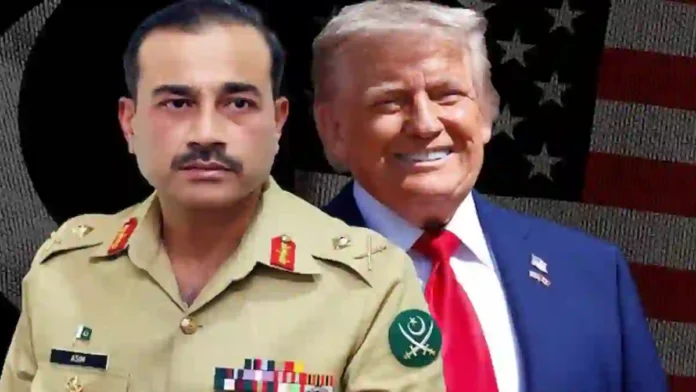The evolving dynamic between the United States and Pakistan under Donald Trump’s second administration is drawing renewed attention, particularly for its military implications.
According to Associate Professor Paul Poast of the University of Chicago, Washington’s outreach to Islamabad is less about broad diplomatic partnership and more about strategic geography. Pakistan offers the U.S. proximity to two key rivals, China and Iran, making it a valuable logistical platform for American power projection in the region.
Read- IAF Finalises Mega TEJAS MK-1A Deal, 97 New Fighters
Poast emphasised that Pakistan’s role today is being reframed as that of a logistical enabler rather than solely a political ally. With its location adjacent to both China and Iran, Pakistan provides the U.S. with a critical gateway for military assets. A physical American presence in Pakistan, he noted, would effectively shorten operational distances and allow rapid deployment in contingencies involving Tehran or Beijing.
This cooperation must also be understood within the Trump administration’s broader worldview, which places military force at the forefront of U.S. policy. Poast pointed to the controversial executive order that symbolically renamed the Department of Defence to the Department of War. This shift, he argued, is part of a deliberate narrative positioning armed power as central to governance and statecraft. For Pakistan, this lens enhances its utility in Washington’s priorities: less as a development or diplomatic partner, and more as a partner in hard power logistics.
Poast noted that these moves fit into the White House’s renewed interest in reclaiming strategic assets such as the Bagram airbase in Afghanistan. In his assessment, pushing for Bagram aligns with the same logic that makes Pakistan valuable—forward basing closer to China’s western frontiers and Iran’s contested nuclear infrastructure. From Washington’s perspective, control over such nodes is essential to sustaining deterrence and offensive capability in a shifting global order.
Poast also linked the June 22 U.S. strikes on Iranian nuclear facilities—codenamed Operation Midnight Hammer—as evidence of why proximity matters. Attacks on Fordow, Natanz, and Isfahan depended on pre‑positioned bases, personnel, and regional partnerships. This operational model, he argued, reinforces why the Trump administration is courting Pakistan: secure access makes future military actions feasible and less politically constrained.
Read- What Key Role Will Sukhoi Su-57 Stealth Fighter Play For The Indian Air Force?
Another revealing detail is the administration’s preference for direct engagement with Pakistan’s military establishment rather than its civilian government. Poast observed that the Trump White House views Pakistan’s army as the real enabler of U.S. operational objectives. By side-lining political protocol, and privileging meetings with military leaders like Chief of Army Staff Asim Munir, Washington is showing a pragmatic if transactional approach.
This realignment was underscored by the recent Oval Office meeting in Washington between President Trump, Prime Minister Shehbaz Sharif, and COAS Munir. Tellingly, the White House has not released any official photos or video of the encounter, raising questions about transparency.
In contrast, a same‑day meeting with Turkish President Recep Tayyip Erdogan was followed by a high‑profile joint briefing. The muted handling of the Pakistan meeting, left to official Pakistani channels to publicise, suggests the sensitivity of this renewed partnership.
The trajectory highlighted by Poast suggests that U.S.-Pakistan relations are being defined less by mutual political trust and more by cold strategic necessity. With increasing confrontation between Washington and Beijing, alongside ongoing tensions with Tehran, Islamabad’s geography makes it indispensable. However, the opaque nature of Trump’s outreach, combined with its militarised framing, may fuel both regional suspicions and domestic debate within Pakistan.
Based On ANI Report
Agencies




